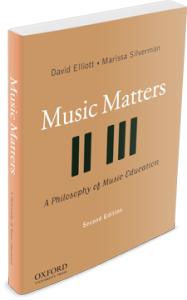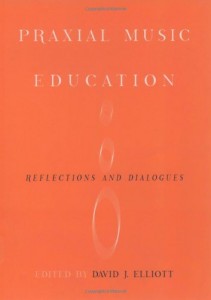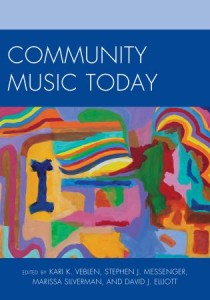The praxial philosophy of music education rests on two premises. The first premise is that the nature of music education depends on the nature of music. The second premise is that the significance of music education depends on the significance of music in human life.
In other words, the most reasonable way to explain the nature and values of music education is to begin with an explanation of the nature and significance of music.
Below are summaries (but not full explanations) of what Music Matters proposes about the nature and values of music.
The Nature of Music
“Pieces” of music are, of course, central to what “music” is. But, is it reasonable to assume that an explanation of the nature of musical works will yield a comprehensive understanding of the nature and values of music? No. Beginning with this assumption risks the possibility of producing a narrow and implausible concept of music and, therefore, a narrow and implausible philosophy of music education.
So, let us begin with the observation that the auditory events we call “musical works” usually result from the actions of people (e.g., performers performing; improvisers improvising, and so on) who live in particular times and places and who make musical “products” in relation to histories and standards of musical practice (whether they know these histories and standards formally or informally) .
In short, musical products — performances, improvisations, compositions, or arrangements — are enmeshed in and derive their nature and significance from their contexts of creation and use. Even the structural details of musical patterns owe their characteristic features to the reflections of music makers who work at particular times in the history of their musical cultures. Works of music are, therefore, artistic-cultural constructions, and our personal acts of music listening involve complex cognitive construction processes which also operate in relation to our social-cultural beliefs.
Accordingly, I argue that the processes of listening to music (of any kind) involve and yield several interconnected dimensions of meaning: affective, interpretive, structural, expressional, representational, social, ideological and/or personal meanings.
In this view, the auditory events we call “music” challenge our powers of consciousness on many levels: “pieces” of music are multidimensional challenges and, therefore, thought-and-feeling generators. (For a full explanation of the music-affect relationship, see Chps. 4-9 in Music Matters).
And MUSIC, considered broadly and socially, is the diverse human practice of making sounds of particular kinds for listeners who understand (informally or formally) how to listen for these particular kinds of Musics (e.g., Japanese Koto music, Dixieland jazz, Donegal fiddling). I suggest, also, that the performing art of music (which involves acts of performing, improvising, composing, arranging and/or conducting) depends on a multidimensional form of understanding called musicianship which (of course) includes music-listening abilities, or “listenership.” Musicianship and listenership are two sides of the same cognitive coin.
Listenership involves the covert (mental) construction of intramusical relationships (within works) and intermusical relationships (between works) through the same kinds of knowing that make up musicianship: procedural, formal, informal, impressionistic and supervisory musical knowing. The knowings required to listen effectively for the musical works of a given practice involve the same kinds of knowing required to perform, improvise, compose, arrange and/or conduct the music of that practice.
The Values of Music and Music Education
Music and music education have many values. To me, the most important of these values occur (as the psychologist Mihalyi Csikszentmihalyi suggests) when there is a balance between our musicianship and the wide range of cognitive-affective challenges involved in musicing (as performers, improvisers, composers, arrangers or conductors) and listening intelligently for music. When our levels of musicianship match the challenge-levels of the pieces we interact with, we achieve the central values of musicing and listening: namely, musical enjoyment (or “flow”), self-growth, self-knowledge (or constructive knowledge) and (through continuous involvements with music over time) self-esteem.
In this view, musicianship is not only a rich form of thinking and knowing, it is a unique source of one of the most important kinds of knowledge humans can achieve: self-knowledge.
In addition to these values, musicing (of all kinds) and musical works extend the range of our expressive and impressive powers by providing opportunities for us to create musical expressions of emotions, musical representations of people, places and things and musical expressions of cultural-ideological meanings. This range of opportunities for musical expression and creativity offers people numerous ways of giving artistic-cultural form to their powers of feeling, thinking, knowing, valuing, evaluating and believing which, in turn, challenge other listeners’ conscious powers and musical understandings.
I wish to emphasize, also, that musical practices are significant because the musical works they produce play important roles as unifying cultural artifacts: that is, cherished musical works are crucial to establishing, defining, delineating and preserving a sense of community and self-identity within social groups. In other words, musical pieces and practices constitute and are constituted by their social contexts.
Additionally, teaching and learning a variety of Musics comprehensively as music cultures is an important form of multicultural education. Why? Because the process of learning and “entering into” unfamiliar Musics activates our self-examination and the personal reconstruction of our relationships, assumptions and preferences about other people, other cultures and other ways of thinking and valuing. Inducting learners into
unfamiliar musical practices links the central values of music education to the broader goals of humanistic education.
Last, if music making or listening prove beneficial for the development of students’ spatial, mathematical, or scientific (or other cognitive) abilities, then these benefits will most likely develop more deeply and frequently to the degree that music education programs become deeper and more available to all students.
These perspectives on the nature and significance of music provide the basis for my praxial recommendations about what music teachers ought to teach, and how.



